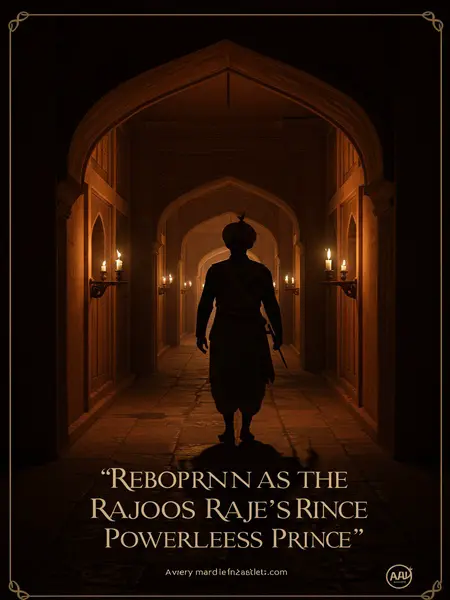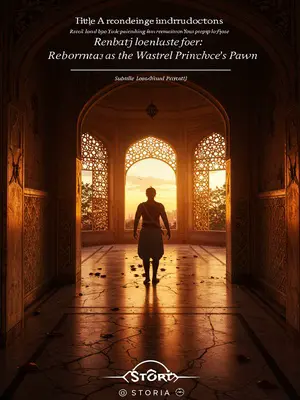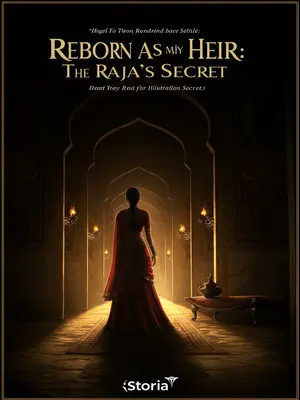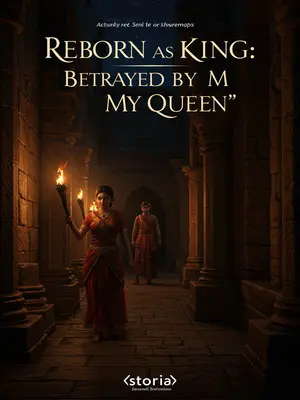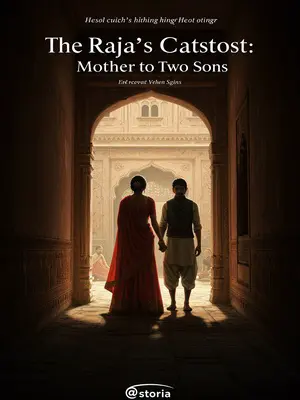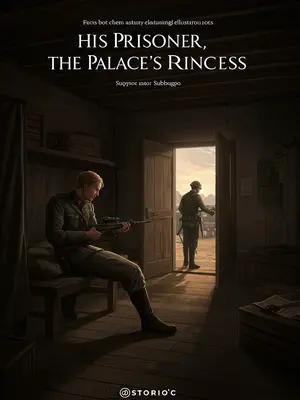Chapter 2: The Rituals of Power
Before dawn, Rajeev Maurya opened his eyes once again, filled with despair.
A rooster crowed somewhere in the city, and the call of the muezzin drifted over the sleeping rooftops, mingling with the far-off rattle of a milkman’s cycle. Rajeev stared at the faded ceiling, breath misting in the chilly pre-dawn air, the taste of unfinished dreams bitter on his tongue. Outside, the neem tree cast a dappled shadow through the latticed window, as if reminding him of the world’s unending burdens.
The glorious era of the Great Maurya had long since passed. Now, it was the second day of the tenth month in the twentieth year of Rani Indira Devi’s reign. This situation was not unfamiliar to Rajeev Maurya; after all, soul transmigration was something he felt an inexplicable connection to.
He could almost hear the echoes of Sanskrit shlokas and the clang of ancient swords, but now it was only the distant sound of temple bells and the blare of a temple loudspeaker announcing the day’s aarti. He turned over, the starched sheet rustling, and tried to remember the warmth of his mother’s hands pressing tilak on his forehead—was that in this life, or another?
What made him hopeless was not just a fleeting yellow millet dream, nor a simple change of dynasties—
Even the gods above seemed to have gone silent, watching the farce unfold below. The weight of generations pressed on his chest, leaving a dull ache that neither incense nor whispered mantras could soothe. It wasn’t just the end of a dynasty—it was the ending of memory itself.
It was Indira Devi’s sixtieth birthday.
Sixty years. In his mind’s eye, he saw her as both fierce matriarch and frail grandmother, always draped in Kanchipuram silks, her silver hair coiled in a tight bun, a single ruby bindi glowing like a warning light on her forehead. The palace buzzed with preparations—kitchen fires blazing, trays of besan laddoos lined up in perfect rows, and the chief steward barking orders about rosewater for the guests.
That old matriarch was returning to the Red Fort from the Summer Bungalow today, enjoying the sights and eating mangoes along the way, while Rajeev was expected to display filial piety.
He imagined her reclining in her palanquin, a peeled Alphonso mango in one hand, her voice sharp as ever as she called for the musicians to play something cheerful. He pictured himself sweating in his heavy sherwani, the gold zari itching at his neck, bending low to touch her feet while her gold bangles clinked softly above his bowed head, all under the watchful eyes of half the city. "Neki kar, dikhawa mat kar," he reminded himself, though the hypocrisy tasted sour.
How was he supposed to do that?
Even the thought of prostrating again, of performing the same tired gestures, made his back ache in anticipation. He longed for the old days, when a man could prove himself with the sword, not by how low he bowed. Yet, the rules of the house—the rules of India—were unyielding, like the smell of mothballs in the ancestral shawls.
Early in the morning, he would first go to the Summer Bungalow and touch Indira Devi’s feet to bid her farewell.
He would stand awkwardly, palms pressed together, the cool marble underfoot, trying not to wince as her gold-bangled hand rested briefly on his head in blessing. The air would be thick with agarbatti smoke and the sweet stickiness of early-morning halwa offered to the gods. Somewhere, a servant would cough discreetly, as if reminding him that even emperors must obey.
After sending her off, he would walk ahead to lead the way, all the way to Chowpatty Road, where Indira Devi would pause to admire the scenery, and Rajeev would stand there, waiting. Once Indira Devi’s golden palanquin had passed far enough, Rajeev would dash ahead, take a shortcut, and enter the fort through the Lotus Gate.
He had done this so often that the guards barely looked up as he jogged past, his slippers slapping the old sandstone. The air would be heavy with the scent of frangipani and frying pakoras from the street vendors nearby. Sometimes, he envied those boys on the street, their only worry the next cricket match or the sound of the ice-cream wallah’s bell.
Once inside, he would stand again—waiting until Indira Devi arrived.
He always found himself by the carved jali windows, watching dust motes dance in the sunlight, as the household bustled to prepare for the Rani’s arrival. The sound of temple bells, distant laughter, and the persistent clang of a pressure cooker from the kitchens blended into a peculiar symphony that marked every festive occasion in this palace.
And who was this unfortunate Rajeev?
A question every palace servant and neighborhood gossip had pondered at some point, whispering tales as they sipped cutting chai. Some said he was blessed, others that he was cursed; only he knew how close fortune and misfortune could sit at the same table.
Naturally, it was none other than the beloved Emperor Ashoka of the Great Maurya.
Ashoka—now Rajeev—often caught himself gazing at the old swords hung on the wall, fingers itching to grip their hilts. In those quiet moments, he would mutter, "Yeh sab natak kab khatam hoga?" before pulling himself together. Even in the 20th century, the weight of his old name pressed against his chest like an unspoken prayer.
Every morning, as he opened his eyes, Rajeev’s eyelids would twitch, thinking: How many more times must I stand in respect? How many more years must I pretend to be a dutiful grandson? The anger in his chest simmered.
Each day began with a battle—not against enemies, but against the endless rituals of obedience. The frustration burned inside him like the strong tea that fuelled the early risers of the palace. He would stare at the ceiling fan’s slow rotation, thinking, “Beta, this is not your battlefield, but your time will come. Sabra karo.”
Since transmigrating into Rajeev, Ashoka had lived like this for five years.
Five monsoons had swept over the city, five Diwalis passed with lamps lining the fort’s ramparts, and each year the same prayers repeated, the same shadows lengthening. At night, he listened to the distant strains of a shehnai and wondered if the gods had simply stopped listening.
Ashoka: Five years—do you know how I have endured these five years? I am the Chakravarti, Grand General of the Maurya armies. When have I ever suffered such humiliation?
He recalled charging into battle, elephant bells ringing, his war cry echoing across the plains. Now, he was reduced to a token, a mere heir forced to smile and bow at birthdays. "Haan, Bhagwan, kya kismet hai," he would grumble, sometimes thumping the old wooden table until the oil lamp flickered.
But whenever Ashoka closed his eyes, he would see the great fire at the Somnath Temple, the wailing of people across the land, the countless souls of righteous martyrs—all of them surged into his heart.
He remembered the stories his nani told—how the firangis came, how the temples burned, how mothers hid their children in grain sacks to save them from bayonets. Visions of burning temples, broken idols, and the echoing cries of his people haunted his dreams. Sometimes, late at night, he would light a diya at the window and whisper a prayer for the lost souls, pressing his palm to his forehead in silent apology. The city slept, but he did not.
These scenes had haunted him since the first day he arrived. At first, he was confident, thinking that with a twenty-year-old’s body, he could handle any situation.
He’d scoffed at the weakness of these modern men, sure that his old strength would return at the first call to arms. But the world of ink and files, of whispered politics and slippery deals, proved far more treacherous than a battlefield. He missed the simplicity of a drawn sword.
No matter which dynasty fell or whose ideals were shattered, it was all within his grasp.
He remembered his own oath—standing on the fort walls as a youth, vowing, "Jab tak saans hai, I will protect my people." Now, every oath felt like a weight, every promise a chain. The burden of history pressed down, demanding more than mere muscle.
The history in his mind flashed by, and several events made Ashoka furious: the sack of Vijayanagara, the Partition riots, the Jallianwala Bagh massacre, the Black Hole of Calcutta.
Images swirled—blood on white kurta-pajamas, silent weeping mothers, rifle smoke rising over Amritsar. The pain was personal, as if the centuries had collapsed onto his shoulders. He would clench his jaw, recalling the words of the gurdwara granthi, "Shaheedi is not just death, it’s a sacrifice for the nation."
Ashoka took a deep breath, thinking he had come to overthrow this dynasty and restore the glory of Maurya and Gupta.
He found solace in old verses from the Bhagavad Gita: "Karmanye vadhikaraste…" but the modern world mocked him for clinging to dharma. The clash between his ancient ideals and the new pragmatism tore at his heart, even as he planned quietly, always quietly.
Unexpectedly, it wasn’t just the British that were as fragile as a pile of clay pots—the whole of Bharat was at the brink.
He saw the cracks everywhere: in the eyes of underfed children on the palace steps, in the half-ruined shrines by the roadside, in the nervous laughter of clerks as they passed secret messages under the table. It wasn’t just the foreigners; it was the rot within that made the nation crumble.
When he arrived, Raja Rajeev had just come to power, the two Anglo-Sikh Wars were over, and the Raj had signed treaties with Britain, France, Portugal, even the Dutch. The great powers carved up the country with knives every day—what they were taking wasn’t just gold, but the sweat and blood of four hundred million people.
He remembered the old men in the village, spitting paan and cursing the firangis. But the real theft was not just of gold or land; it was of dignity, of dreams. Ashoka sometimes caught the kitchen staff whispering, their faces pinched with worry: "Aaj bhi ration kam hai, memsahib."
How could the people not rebel?
The bazaar buzzed with quiet talk, fists clenched on lathi handles. In back alleys, young men gathered to listen to seditious pamphlets read in hushed voices. The old women prayed at roadside shrines, their offerings mixed with tears and hope for a savior.
After suppressing the Sepoy Mutiny, the Raj launched the Self-Strengthening Movement, but the Zamindars had rotted to the core. Advanced rifles piled up in warehouses, no one knew how to use them, and after major defeats, they were simply handed over to the foreign powers.
He’d seen it all: rifles rusting in musty storerooms, Zamindar sons too lazy even to clean them. Men played chess in the shade, sipping sherbet, while the country’s lifeblood drained away. The very guardians of the land had become parasites.
A crisis unseen in thousands of years, with the great powers coveting, Bharat as fragile as clay pots.
Ashoka felt a bitter taste rise in his throat. His mind flicked back to the stories his nani used to tell him: "Bharat is like mitti—soft but stubborn. Crush it, and it rises again." Yet now, the clay seemed only to crumble in the face of greed and cowardice.
